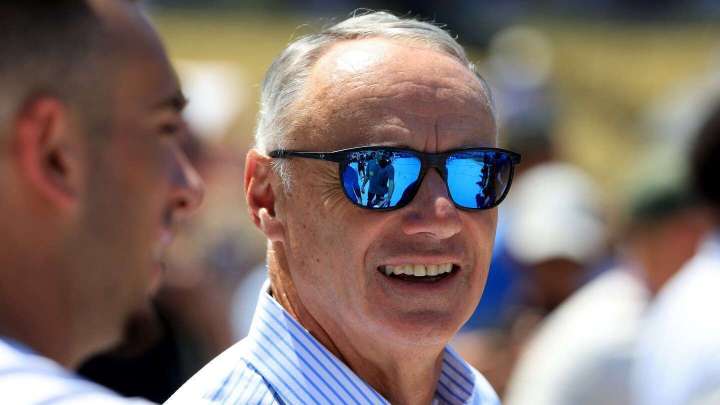LOS ANGELES — MLB Commissioner Rob Manfred stoked the already billowing flames surrounding working conditions for minor leaguers Tuesday when he rejected the notion that minor leaguers do not make enough to live on.
Rob Manfred disputes premise that minor leaguers aren’t paid a living wage

Manfred’s comments came amid sweeping changes to the relationship between MLB and its developmental leagues — some intentional on MLB’s part, some less so. MLB took control of the minor leagues ahead of the 2021 season, cut 40 affiliates and raised facility and nutrition standards for the 120 affiliates that remained. It increased minor league salaries by 38 to 72 percent, but even with the increase many still made less than $20,000 per year — and nothing in the offseason.
A year later, after months of public pressure from minor league advocacy groups, MLB implemented a housing requirement, but salaries remain far below minimum wage.
“Most Minor League baseball players work second jobs because their annual salaries are insufficient to make ends meet. The commissioner makes an annual salary of $17.5 million. His suggestion that Minor League pay is acceptable is both callous and false,” Harry Marino, head of advocacy group Advocates for Minor Leaguers, said in a statement.
Marino’s group — along with one led by former player Garrett Broshuis — has spent much of the past two years raising questions about minor league pay, increasing awareness to the point that the Senate Judiciary Committee sent a letter to Manfred this week asking for information about how MLB’s long-standing antitrust exemption affects the way it treats minor leaguers.
That exemption has come under fire not only from the legislative branch lately but also the judicial. A class-action lawsuit, in which former players alleged wage violations, was settled in California, pending the approval of a judge. That settlement would award $185 million (reportedly with an average payment of about $5,000) — and more importantly would include MLB agreeing to rescind rules preventing teams from paying minor leaguers in the offseason.
At least one other lawsuit challenging the antitrust exemption seems likely to reach higher courts soon, meaning Manfred’s comments came at a time when the fact that minor leaguers are underpaid is no longer a matter of public dispute but rather a catalyst to dislodge some of the control MLB has over the way teams treat their young players.
“Helping those guys find their voice and not just make it better for themselves in the nearest term but for the next generation is something players and our fraternity has been historically committed to,” MLB Players Association Executive Director Tony Clark said. “… We are watching. We are providing support when and where possible.”
Changes to the relationship between the minor and major leagues have been swift in coming. Changes to the relationship between the players union and Manfred’s office have been slower in coming, particularly after contentious labor negotiations this offseason. Asked about Manfred’s efforts to reach out to players and a stated commitment to improving his relationship with them, Clark was vague but not overly encouraging in his assessment.
“I don’t know if ‘repairing relationships’ should be the headline,” Clark said. “Making sure that there is a respect and an understanding that integrity matters. What you say matters. What you do matters more.”
Clark and Manfred speak separately to the Baseball Writers’ Association of America at this time every year, covering a wide range of topics, some more contentious than others. Manfred made clear that while he would like MLB to expand, it cannot do so until the Tampa Bay Rays and Oakland Athletics have more permanent homes. He said he does not know when the sale of the Washington Nationals will be complete but said the process has reached the stage where potential buyers are looking through data and financials.
Clark indicated that a pitch clock, bigger bases and shift-limiting rules have been discussed by the newly formed competition committee and that the committee is in the midst of the allotted 45-day discussion period that precedes a formal vote. If the committee votes favorably at the end of that period, those rules could be in place in the majors by the start of next season.






